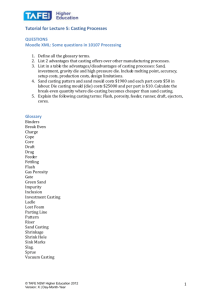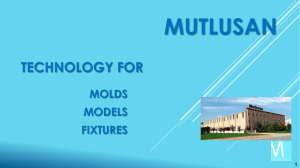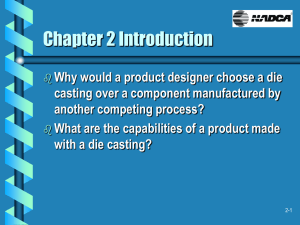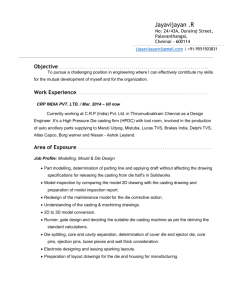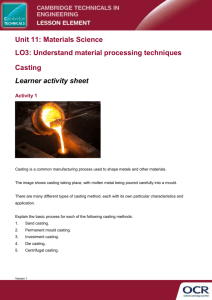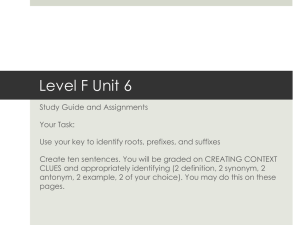PRESIDENT'S INDUSTRY OUTLOOK
advertisement
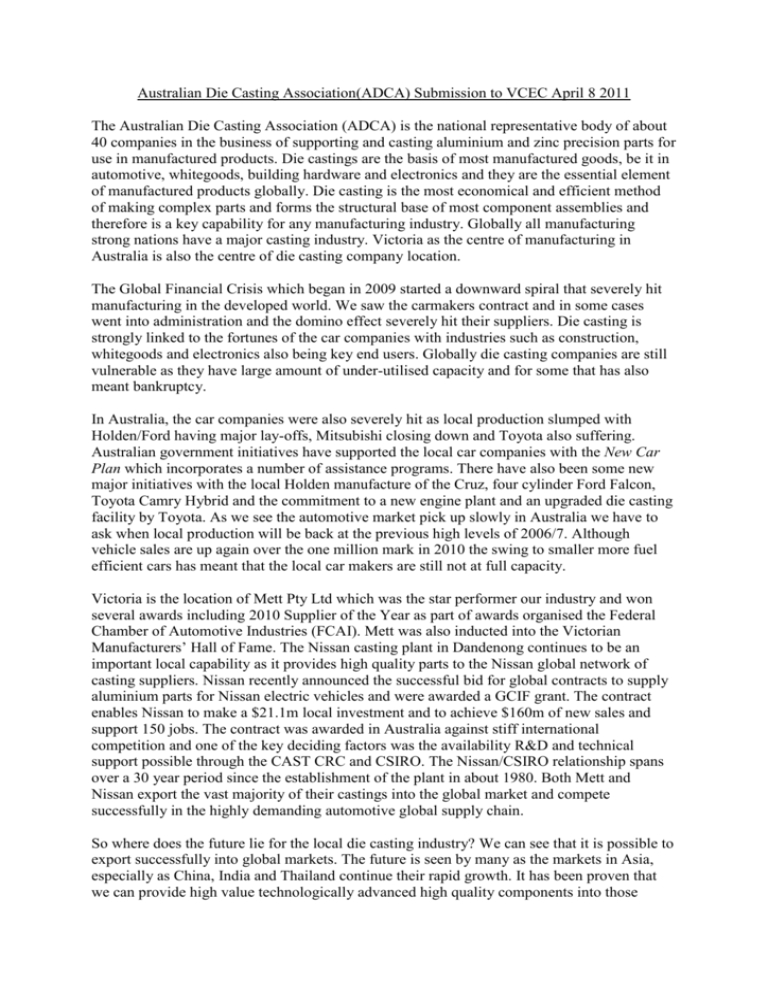
Australian Die Casting Association(ADCA) Submission to VCEC April 8 2011 The Australian Die Casting Association (ADCA) is the national representative body of about 40 companies in the business of supporting and casting aluminium and zinc precision parts for use in manufactured products. Die castings are the basis of most manufactured goods, be it in automotive, whitegoods, building hardware and electronics and they are the essential element of manufactured products globally. Die casting is the most economical and efficient method of making complex parts and forms the structural base of most component assemblies and therefore is a key capability for any manufacturing industry. Globally all manufacturing strong nations have a major casting industry. Victoria as the centre of manufacturing in Australia is also the centre of die casting company location. The Global Financial Crisis which began in 2009 started a downward spiral that severely hit manufacturing in the developed world. We saw the carmakers contract and in some cases went into administration and the domino effect severely hit their suppliers. Die casting is strongly linked to the fortunes of the car companies with industries such as construction, whitegoods and electronics also being key end users. Globally die casting companies are still vulnerable as they have large amount of under-utilised capacity and for some that has also meant bankruptcy. In Australia, the car companies were also severely hit as local production slumped with Holden/Ford having major lay-offs, Mitsubishi closing down and Toyota also suffering. Australian government initiatives have supported the local car companies with the New Car Plan which incorporates a number of assistance programs. There have also been some new major initiatives with the local Holden manufacture of the Cruz, four cylinder Ford Falcon, Toyota Camry Hybrid and the commitment to a new engine plant and an upgraded die casting facility by Toyota. As we see the automotive market pick up slowly in Australia we have to ask when local production will be back at the previous high levels of 2006/7. Although vehicle sales are up again over the one million mark in 2010 the swing to smaller more fuel efficient cars has meant that the local car makers are still not at full capacity. Victoria is the location of Mett Pty Ltd which was the star performer our industry and won several awards including 2010 Supplier of the Year as part of awards organised the Federal Chamber of Automotive Industries (FCAI). Mett was also inducted into the Victorian Manufacturers’ Hall of Fame. The Nissan casting plant in Dandenong continues to be an important local capability as it provides high quality parts to the Nissan global network of casting suppliers. Nissan recently announced the successful bid for global contracts to supply aluminium parts for Nissan electric vehicles and were awarded a GCIF grant. The contract enables Nissan to make a $21.1m local investment and to achieve $160m of new sales and support 150 jobs. The contract was awarded in Australia against stiff international competition and one of the key deciding factors was the availability R&D and technical support possible through the CAST CRC and CSIRO. The Nissan/CSIRO relationship spans over a 30 year period since the establishment of the plant in about 1980. Both Mett and Nissan export the vast majority of their castings into the global market and compete successfully in the highly demanding automotive global supply chain. So where does the future lie for the local die casting industry? We can see that it is possible to export successfully into global markets. The future is seen by many as the markets in Asia, especially as China, India and Thailand continue their rapid growth. It has been proven that we can provide high value technologically advanced high quality components into those markets. I believe this is the only way forward as the local market remains flat. It is possible that other companies could follow the lead of the two aforementioned companies. Other areas of opportunities will emerge in the move towards the electrification of vehicles and the reduction of emissions. Weight reduction is a big factor in reducing fuel consumption and emissions and probably more so in electric and hybrid vehicles because of increased weight due to batteries. Weight reduction has been recognized globally with every carmaker and automotive research program including lightweight design and materials as an important area of development. Energy efficient manufacturing is also important as the energy consumption and therefore emissions generated by production processes are considered. Die Casting has a major advantage as the aluminium (secondary metal) is a recyclable metal and requires a fraction of energy content compared to primary aluminium. It is important that our companies thoroughly understand their energy consumption sources and endeavour to achieve world class energy efficiency. In the recent Team Australia Automotive mission into Detroit a senior buyer from Chrysler stated “we would like to get our parts at the material source (aluminium) and that puts Australia as a good location, we import castings from Brazil and there is no reason why it cannot be from Australia”. Victorian companies are already doing this successfully and there are many opportunities in the global market. t. ADCA supports the die casting industry and seeks to help in its growth and capability development. ADCA urges the Victorian government to collaborately support this vital industry as it plays a pivotal role in developing a more competitive manufacturing industry which will secure a successful manufacturing future for this state and Australia. Sam Tartaglia National President Australian Die Casting Association

